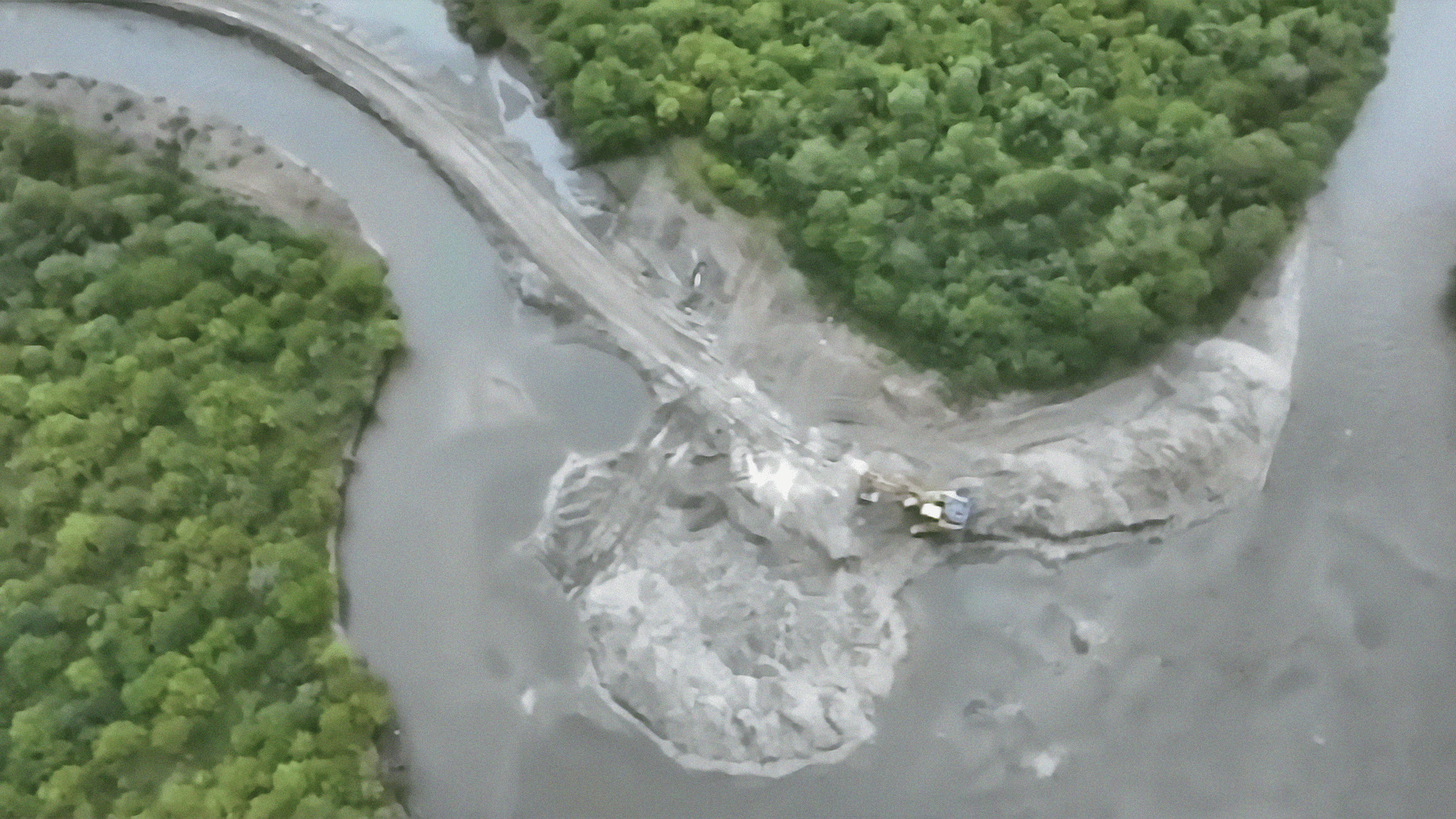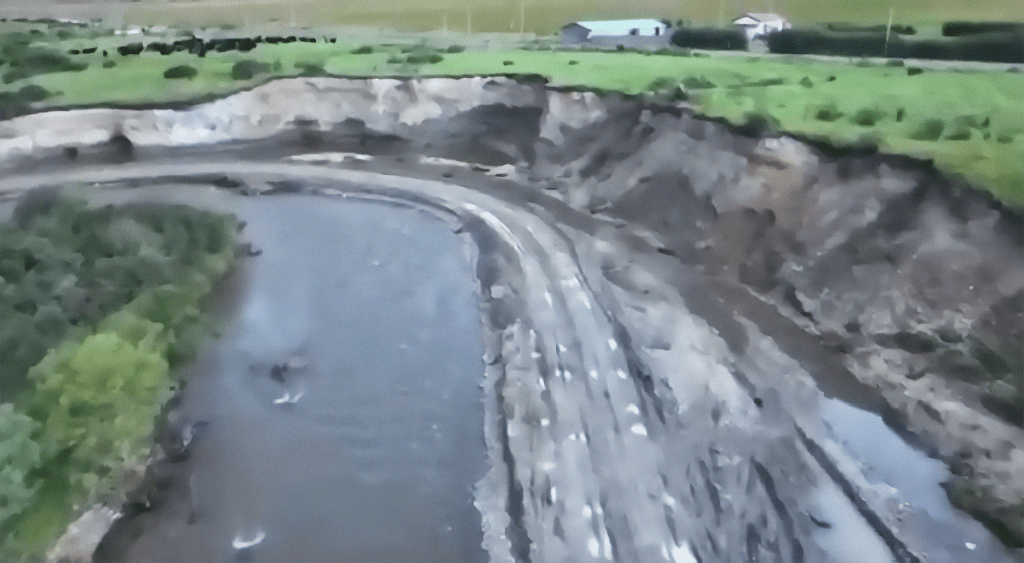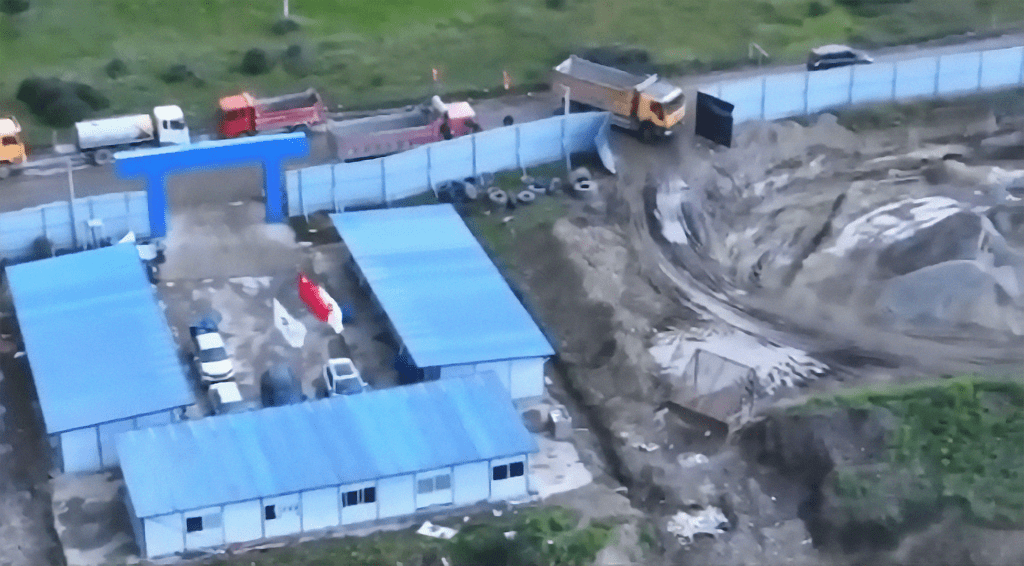
Tibetan urges government to restore river ecosystem
Video message from a Tibetan petitioner exposes illegal sand mining and absence of consultation with local Tibetans in China’s petition system.
A Tibetan petitioner has appealed the central Chinese leadership to protect the river ecosystem of his hometown from being irreversibly damaged by illegal extraction of sand – one of the most mined resources indispensable for urbanisation and construction.
On 15 October, Tsowo Tsering, a Tibetan man in his late twenties, shared a video message on his social media account in a desperate measure to reach out to the central Chinese government. The video, which has now been removed, reveals drone footage of numerous vast open pits caused by mining of sand from the riverbed of his hometown of Tsaruma, and ends with a series of appeals to the central government.
Tsowo delivered the entirety of his message in Chinese, calling for ecological protection, punishment for those involved in its destruction, and restoration of the river ecosystem that has been damaged by Anhui Xianhe Construction Engineering Company. He also earnestly requested for investigation into local government departments acting in collusion with the corporation, and for the central government to adhere to a motto which China has been widely promoting since 2018 as part of Xi Jinping’s thought of “ecological civilisation” : lucid waters and lush mountains are invaluable assets.
He chronicled how the extraction, taking place during construction of a road that is carved centrally through the river, has left behind a trail of destruction since May 2023, causing soil erosion and pollution of the Tsaruma River.

Screenshot of soil erosion caused by extraction of sand from the riverbank of the nomadic area of Tsaruma Township. Source: Video message of Tsowo Tsering uploaded on his social media account on 15 October 2024.
He shared that no one from his village was consulted during the review process of their petition, the decision of which Tsowo said he was informed in April 2024, stating, that Tsaruma pastoralists had been informed “multiple times, in writing or in person,” about the results of investigation carried out by the Department of Transportation and Water Affairs.
The decision was informed to Tsowo in a letter from the Ecological Protection Bureau of Chungchu County, which concluded that Anhui Xianhe Construction Engineering Company had been penalised and their extraction declared illegal. However, Tsowo explained in the video that no action had been taken till date to restore the river ecosystem despite his fellow villagers having submitted photos and video evidence of damaged sites to various echelons of government authorities: Tsaruma Township government, Chungchu County Commission for Discipline Inspection, Environmental Protection Bureau and Water Affairs Bureau of Chungchu County, as well as Ngawa Prefecture Water Affairs Bureau and Environmental Protection Department.

Carrier trucks stationed near a fenced open pit nearby Tsaruma River. Source: Video message of Tsowo Tsering uploaded on his social media account on 15 October 2024.
Tsowo’s message is an example of the growing knowledge of young Tibetans that China does have environment laws, and that they apply in Tibet, the Water Tower of Asia. Showing understanding of China’s power structures, he calls on the Discipline Inspection Commission of Chinese Communist Party to be asked to take action. He warned that “the low cost of violating the law” causes not least, destabilsation of the foundation of housing infrastructure of Tsaruma pastoralists, but also threatens the biodiversity of surrounding region, and exacerbates water security of Machu and Drichu River.
Tsaruma River is a tributary in the township that goes by the same name. Smaller rivers of the county of Tsaruma Township become tributaries of Machu (Yellow) and Drichu (Yangtse) River, both of which flows into mainland China. The township of Tsaruma (Ch: Chaerma) is located in Chungchu (Ch: Hong yuan) County, Ngawa (Ch: Aba )Tibet Autonomous Prefecture, Sichuan Province.
Information supplied by Tibet Watch
Translation of Tsowo Tsering’s Video Message
My name is Tsowo Tsering.
I currently reside in Tsaruma Township, Chungchu County, Ngawa Tibetan Autonomous Prefecture, Sichuan Province.
I am making a real-name report against Anhui Xianhe Construction Engineering Company for their egregious illegal mining of sandstone from riverbeds during road construction in Tsaruma Township.
Since May 2023, the company’s illegal mining activities have severely damaged the local ecological environment. Large amounts of sand have been recklessly mined, leading to serious soil erosion in the surrounding areas. This endangers the foundations of residents’ homes. The excavated Tsaruma River is a tributary of the sources of Yangtze and Yellow Rivers. This destructive behavior seriously threatens the water security of both the Yangtze and Yellow rivers. The pollution of these source tributaries is closely related to the local ecology and biodiversity protection, directly impacting the Asian Water Tower and plateau wetlands. Therefore, strengthening ecological protection and governance is crucial.
Regarding such severe ecological destruction and its profound impact on local residents, some villagers spontaneously reported to various local authorities including Tsaruma Township government, Chungchu County Commission for Discipline Inspection, Environmental Protection Bureau (Chungchu County), Water Affairs Bureau (Chungchu County), as well as Ngawa Prefecture Water Affairs Bureau and Environmental Protection Department.They provided numerous photos and videos of the damaged sites. However, the relevant departments seemed to have turned a blind eye [to what is happening] and were impervious – neglecting their duties in the handling process. The environmental issues were not thoroughly governed, and the harm to local people persisted, leaving the complainants no door to appeal.
Although good ecological and environmental protection policies were introduced many years ago, there are still problems in their implementation.
In April 2024, the Ecological Protection Bureau of Chungchu County, Ngawa Prefecture, Sichuan, provided me with a petition response, confirming that Anhui Xianhe Construction Engineering Company had indeed illegally excavated sandstone in Tsaruma, and had been penalised and the case closed. However, they harbor and protect the relevant enterprises, using fines as a substitute for management, and downplay the issue.
The restoration of the ecological environment and the treatment of lost soil and water have not been carried out. Only in a perfunctory manner to build house foundations were endangered. The threat of soil erosion in the surrounding area continues to exist and is becoming increasingly severe. The consequences of ecological destruction harmed the common people. According to the Environmental Protection Law, in addition to necessary penalties for ecological damage, the damaged environment should also be restored. However, the Ecological Environment Bureau of Chungchu County failed to effectively fulfill its responsibilities in handling this matter and did not effectively stop and correct the environmentally destructive behavior.
Furthermore, in their response, the Ecological Environment Bureau of Chungchu County claimed, that after receiving the first petition report in September 2023, they reported to the county government and its Discipline Inspection Commission, and that the county’s main leaders arranged for multiple departments and townships to verify and investigate. The transportation and water affairs departments handled the matter according to laws and regulations. The results of the investigation and handling were reportedly fed back to the pastoralists of Tsaruma Township multiple times, either in writing or in person. The issue was reportedly reviewed multiple times by the Ngawa Prefecture Water Affairs Bureau and other departments from October to December 2023, and no objections were raised. In early 2024, the Chungchu County Discipline Inspection Commission also reviewed the relevant issues and handling, raising no objections.
However, as the complainant, I am completely unaware of and unfamiliar with the above claims. No Tsaruma pastoralists have ever received any such relevant feedback. The claim of “no objections raised” is purely fictitious. This kind of deceptive response is extremely irresponsible and seriously desecrates and tramples on the petition system, causing it to become ineffective.
Due to the low cost of violating the law, illegal activities are rampant. Over time, environmental damage problems will become increasingly serious and frequent. The consequences will be beyond imagination. When environmental damage reaches a certain level, the collapse of the ecosystem will be an irreversible disaster.
We have lived and flourished on this land for generations. The quality of the ecological environment concerns the health and life safety of our descendants.
If we do not legally punish those who destroy the ecological environment, similar problems will continue to arise. I earnestly request that the central leadership to pay attention to this issue, adhere to the concept of ecological protection that “lucid waters and lush mountains are invaluable assets,” and uphold the spirit of seeking truth from facts. Conduct on-site investigations of the damaged local ecological environment, thoroughly investigate the legal responsibilities of illegal enterprises according to the law, pursue the dereliction of duty of relevant department leaders and responsible persons, deeply investigate possible corruption such as official-bussinesman colluding for bennefits , and thoroughly govern to restore an environment where people can live and work in peace and contentment, and return prosperity to the region.

